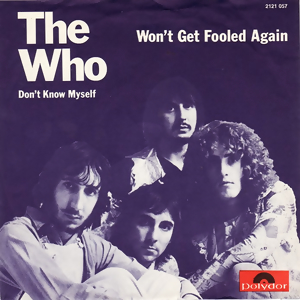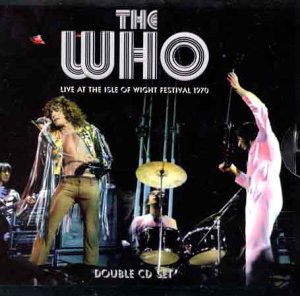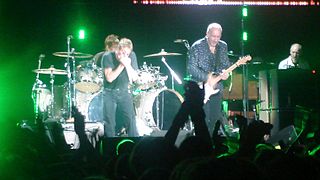
Peter Dennis Townshend is an English musician. He is co-founder, leader, guitarist, second lead vocalist and principal songwriter of the Who, one of the most influential rock bands of the 1960s and 1970s. Due to his aggressive playing style and innovative songwriting techniques, Townshend's works with the Who and in other projects have earned him critical acclaim.

Who's Next is the fifth studio album by English rock band the Who. It developed from the aborted Lifehouse project, a multi-media rock opera conceived by the group's guitarist Pete Townshend as a follow-up to the band's 1969 album Tommy. The project was cancelled owing to its complexity and to conflicts with Kit Lambert, the band's manager, but the group salvaged some of the songs, without the connecting story elements, to release as their next album. Eight of the nine songs on Who's Next were from Lifehouse, the lone exception being the John Entwistle-penned "My Wife". Ultimately, the remaining Lifehouse tracks would all be released on other albums throughout the next decade.

Psychoderelict is a concept album written, produced and engineered by Pete Townshend. Some characters and issues presented in this work were continued in Townshend's later opus The Boy Who Heard Music, first presented on The Who's album Endless Wire and then adapted as a rock musical.

Who Are You is the eighth studio album by English rock band the Who, released on 18 August 1978 by Polydor Records in the United Kingdom and MCA Records in the United States. Although the album received mixed reviews from critics, it was a commercial success, peaking at number 2 on the US charts and number 6 on the UK charts.
Lifehouse is an unfinished science fiction rock opera by The Who intended as a follow-up to Tommy. It was abandoned as a rock opera in favour of creating the traditional rock album Who's Next, though its songs would appear on various albums and singles by the Who, as well as Pete Townshend's solo albums. In 1978, aspects of the Lifehouse project were revisited by the Who on Who Are You. In 2000, Townshend revived the Lifehouse concept with his set Lifehouse Chronicles and the sampler Lifehouse Elements. On 1 May 2007, he released an online software called The Lifehouse Method in which any "sitter" could create a musical "portrait". The site is now defunct.

Lifehouse Chronicles is a box set released in 2000 by Pete Townshend with the focus of the box being the formerly "abandoned" Lifehouse rock opera. The set contains song demos by Pete Townshend; including solo versions of "Baba O'Riley", "Won't Get Fooled Again", and "Who Are You", and the Lifehouse Radio Program. The box set release was followed by two Sadler's Wells Lifehouse concerts and the release of a live CD and video/DVD titled, respectively, Pete Townshend Live: Sadler's Wells 2000 and Pete Townshend – Music from Lifehouse.

Endless Wire is the eleventh studio album by the English rock band the Who, released on 30 October 2006 in the UK through Polydor Records and the following day in the US by Universal Republic. It was their first new studio album of original material in 24 years following the release of It's Hard in 1982, as well as their first since the death of the bassist John Entwistle. It was originally due to be released in early 2005 under the working title WHO2.

"Baba O'Riley" is a song by the English rock band the Who, and the opening track to their fifth album Who's Next (1971). It was issued in Europe as a single on 23 October 1971, coupled with "My Wife".

"Won't Get Fooled Again" is a song by the English rock band the Who, written by Pete Townshend. It was released as a single in June 1971, reaching the top 10 in the UK, while the full eight-and-a-half-minute version appears as the final track on the band's 1971 album Who's Next, released that August.

Who Came First is the debut album by Pete Townshend, released in 1972 on Track Records in the UK and Track/Decca in the US.

Live at the Isle of Wight Festival is a double live album by The Who, recorded at the Isle of Wight Festival on 29 August 1970, and released in 1996. A DVD of the concert was also released for the first time in 1996.

Rachel Fuller is a British musician. She is a pop music artist, a composer, and occasional collaborator with her husband rock musician Pete Townshend.
The Who Tour 2006–2007 was The Who's first worldwide concert tour since 1997, supporting their Endless Wire album.

The Boy Who Heard Music is a rock opus that began life as an Internet novella written by musician and songwriter Pete Townshend. Townshend wrote in the foreword to the novella that he typically sketches out his opera in this way to lay out the plots and storylines, but in this case he published the material on an Internet blog site in 2005 and 2006, opening an interactive discussion with readers. The work was later released as a maxi-single and album by The Who and adapted as a rock opera.
Bob Lord is a producer/composer/bassist and CEO of PARMA Recordings, parent company of label imprints Navona Records, Ravello, Big Round, MMC, and Capstone Records. He is also notable for being the bassist/composer of the experimental rock trio Dreadnaught, music director for the NHPR/Music Hall series Writers on a New England Stage, and in-studio producer of Grammy-winning clarinetist Richard Stoltzman.
Lawrence Ball is an English musician and composer who lives in North London. He produces multi-media compositions, performs in concert, and also works as a private tutor in mathematics, music theory and physics.
Biomusic is a form of experimental music which deals with sounds created or performed by non-humans. The definition is also sometimes extended to include sounds made by humans in a directly biological way. For instance, music that is created by the brain waves of the composer can also be called biomusic as can music created by the human body without the use of tools or instruments that are not part of the body.

Pete Townshend Live: Sadler's Wells 2000 is a live album released by Pete Townshend in 2000. Townshend presented the music from Lifehouse at two concerts at Sadler's Wells Theatre in London on February 25 and 26, 2000, supported by a number of musicians and vocalists and The London Chamber Orchestra. Musicians included Pete Townshend, Chucho Merchán, Phil Palmer, John "Rabbit" Bundrick, Peter Hope-Evans and Jody Linscott. Vocalists included Chyna, Cleveland Watkiss and Billy Nicholls. Violinist and orchestra leader Gaby Lester performed the violin solo on "Baba O'Riley". The live recording was issued on a CD album titled Pete Townshend Live: Sadler's Wells 2000 and a video/DVD titled Pete Townshend – Music from Lifehouse in 2002.
Method Music is a double-album of electronic music by the English composer and mathematician Lawrence Ball created using the compositional system that would become The Lifehouse Method, an online-based compositional project conceived by Pete Townshend of The Who to compose customized algorithmically-generated musical portraits. The album's music evolved from tests of the portraiture system.

"Relay" is a song written by Pete Townshend, the guitarist of the Who, for the band's aborted Lifehouse project. The song was also released as a moderately successful single in 1972. It was also the last non-album single by the Who until "Real Good Looking Boy", 32 years later.












